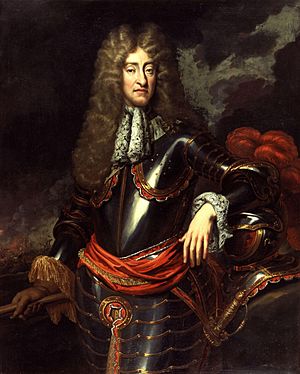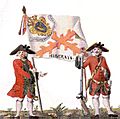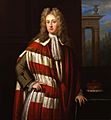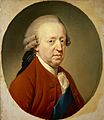Jacobitism facts for kids
Jacobitism was a political movement that wanted to bring the Stuart kings back to the thrones of England and Scotland. After 1707, this meant the throne of the United Kingdom. The name "Jacobitism" comes from the Latin name Iacobus Rex, which means King James.
This movement began after King James VII and II was removed from power in 1688. His daughter, Mary II, and her husband, William of Orange, took his place. After this, the Stuart family lived in other parts of Europe. They sometimes tried to get the throne back with help from countries like France or Spain.
Many people supported Jacobitism for different reasons. Some royalists believed that the Parliament had no right to choose who would be king or queen. Many Catholics hoped it would bring them relief from unfair treatment. In Scotland, the Jacobite cause became linked with the old clan system. It also became a famous and romantic part of Scottish history.
The special symbol of the Jacobites is the white rose. People celebrate "White Rose Day" on June 10. This date marks the birthday of James VIII and III, who was born in 1688.
Contents
What Was Jacobitism?
Jacobitism was a strong belief that the Stuart family should be the rightful rulers. This idea was based on the belief that kings got their power from God, not from people or Parliament. This meant that no one could remove a king from his throne.
Why Did It Start?
The main reason Jacobitism began was the "Glorious Revolution" of 1688. During this event, King James VII and II was removed from power. He was a Catholic king, and many people in England were Protestant. They worried he would try to make England a Catholic country again.
Parliament decided to offer the throne to James's Protestant daughter, Mary, and her husband, William. This upset many people who believed James was still the true king. They felt Parliament had gone against God's will.
Who Were the Jacobites?
Jacobites were people who supported the Stuart kings. They came from different backgrounds and had various reasons for their support.
Royal Supporters
Many royalists believed in the "divine right of kings." This idea said that a king's power came directly from God. They thought it was wrong for Parliament to choose who would rule. For them, James II was still the true king, and his son, James Francis Edward Stuart, was the rightful heir.
Catholic Hopes
Catholics in England, Scotland, and especially Ireland often faced difficult times. Laws often limited their rights and freedoms. They hoped that a Stuart king, especially a Catholic one, would bring them more religious freedom.
Scottish Clans
In Scotland, many clans supported the Jacobite cause. This was often tied to their loyalty to their clan chiefs and their way of life. The Jacobite risings became a way for some clans to show their strength and independence. It also became a lasting memory of a time when the clan system was still very important.
Jacobite Symbols and Legacy
The white rose became a well-known symbol for the Jacobites. It represented their loyalty and hope for the return of the Stuart kings.
Even after the Jacobite attempts to regain the throne ended, the movement left a lasting mark. It became a romantic part of history, especially in Scotland. Stories and songs about the Jacobites and their bravery are still popular today.
Images for kids
-
Alexander Forbes, 4th Lord Forbes of Pitsligo; he believed strongly that kings should inherit their power, a view shared by only a few Jacobites by 1745.
-
Tyrconnell, Deputy Governor of Ireland; he helped build support for the Jacobite government by appointing Catholics to important roles.
-
Tory minister and Jacobite Lord Bolingbroke; he had to leave the country in 1715 but was allowed to return in 1720.
-
Jacobite commander George Murray; he fought in the 1715, 1719, and 1745 uprisings, showing the mixed reasons for Jacobite support.
-
Flora MacDonald by Allan Ramsay around 1749–1750; notice the white roses, a Jacobite symbol.
-
Welsh Tory Sir Watkin Williams-Wynn; his blue coat was often worn by people who supported the Jacobites.
See also
 In Spanish: Jacobismo para niños
In Spanish: Jacobismo para niños
 | James B. Knighten |
 | Azellia White |
 | Willa Brown |











